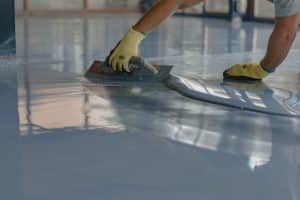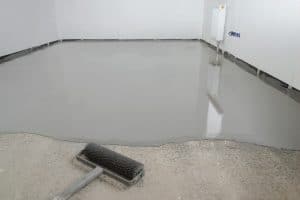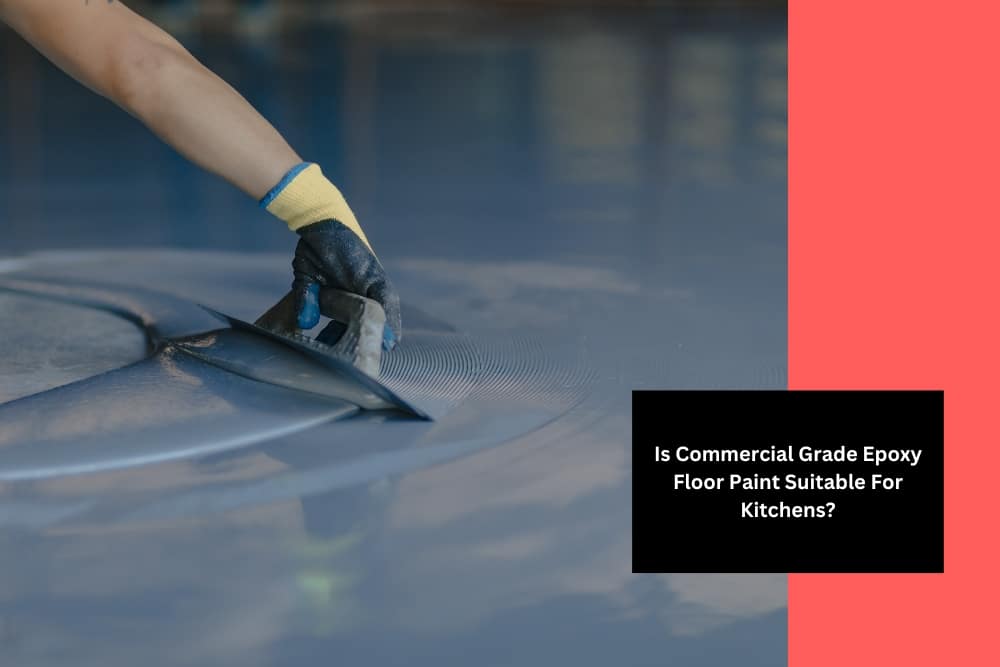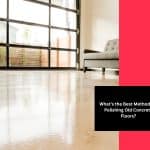Kitchens are war zones. Constant foot traffic, spills of all descriptions, flying utensils, and the occasional grease attack – it’s no wonder homeowners look to commercial grade solutions like epoxy floor paint. But is this industrial strength coating the right fit for your domestic kitchen? Here are the pros and cons to see if it’s the right fit for your home kitchen.
What are the benefits of commercial grade epoxy paint for kitchens?
There’s a reason commercial kitchens often sport epoxy-coated floors. Here’s what this hard-wearing paint brings to the table:
- Built to brawl: Commercial epoxy flooring can take a beating. Heavy foot traffic? No problem. Dropped pots and pans? It shrugs them off. Scratches, abrasions, even minor impacts? It keeps on shining. This translates to a floor that lasts for years, saving you money on replacements down the road.
- Cleaning up is a breeze: Spills and splatters are par for the course in any kitchen. Luckily, commercial epoxy creates a smooth, non-porous surface that makes cleaning a cinch. Most grime wipes away effortlessly with just a damp mop and a good degreaser. Stubborn stains become a thing of the past.
- Safety first: Kitchens can get hectic, and the last thing you want is for someone to get hurt. One easy way to boost safety underfoot is with anti-slip floor coatings. These coatings, often added to commercial epoxy paints, significantly reduce the risk of slips and falls, especially in busy kitchens with constant foot traffic. This translates to a safer work environment for your staff and peace of mind for everyone.
- Looks that cook up a smile: Commercial epoxy isn’t just about function – it can elevate the look of your kitchen too. With a wide range of colours available, and even some options with decorative chips, you can create a sleek, modern aesthetic that complements your overall design.

In short, commercial epoxy flooring offers the durability, cleanability, safety, and style that any busy kitchen needs to thrive.
Are there drawbacks to consider with commercial epoxy paint in kitchens?
Heads-up about commercial epoxy: It’s a fantastic choice for many reasons, but there are a few things to keep in mind.
- Installation: Putting down commercial epoxy isn’t a quick weekend project. It involves prepping the surface properly and following specific application steps. Plus, there’s curing time, so your kitchen might be off-limits for a day or two.
- Durability: Commercial epoxy shines in terms of toughness. It can handle a beating, which is fantastic for high-traffic areas. However, the trade-off is that it can feel a bit unforgiving underfoot for extended periods. Anti-fatigue mats are a great solution for these zones to provide some welcome comfort.
- Cost: You can’t sugarcoat it – commercial epoxy has a higher price tag compared to the options you’d find at your local hardware store. If you’re not a seasoned DIYer, remember to factor in the cost of professional installation as well.
How does commercial grade epoxy paint compare to residential epoxy options for kitchens?
Commercial and residential epoxy paints are both super tough and easy to clean. But to pick the perfect one for your project, there are a few key things to keep in mind:
- Built to last: Strength takes centre stage
Commercial-grade epoxies are the workhorses of the bunch. They’re specifically formulated to handle heavy traffic and abuse. Think of superior strength, better resistance to scratches and scuffs, and the ability to shrug off chemicals compared to their residential counterparts.
- Chemical warfare? No problem (for commercial epoxy)
If you’re expecting battles with harsh chemicals, commercial epoxy is your champion. These are designed to withstand the kind of punishment you might find in professional kitchens – think degreasers and bleach that would leave residential epoxies whimpering.
- Looks matter: Aesthetics for every space
Commercial epoxy tends to focus on performance over appearance, giving it a more industrial aesthetic. In contrast, residential epoxies offer a broader spectrum of colours and finishes, with some even boasting decorative features. This allows you to select an option that aligns perfectly with the design of your space, be it a utilitarian garage or a high-end basement remodel.
What safety precautions should you take when installing epoxy paint in your kitchen?
Here are some essential safety tips to consider when installing commercial epoxy floor paint:

- Air it out: Epoxy can get pretty pungent when you’re laying it down and while it dries. To keep the air fresh, open up some windows and crank up the fans. A respirator is a smart move too, it’ll shield you from breathing in those harsh fumes.
- Surface prep is key: For the epoxy to really stick, you gotta prep the concrete properly. This might mean cleaning it up well, getting rid of any grease, and even roughening the surface a bit. Trust me, it’ll make a big difference.
- Safety: This is paramount when working with epoxy. Think of gloves, safety glasses, and a long-sleeved shirt as your essential companions. Uncured epoxy and skin aren’t exactly the best match!
Is DIY epoxy installation feasible for your kitchen?
Whether you tackle the epoxy installation yourself depends on your comfort level and DIY experience:
- Complexity of the project: Installing commercial epoxy floor paint requires careful preparation, precise application techniques, and knowledge of curing times. It’s not a simple weekend project.
- DIY confidence check: Think you’re a DIY master with a knack for detail and a safety-first mindset? Great! Tackling this project yourself might be a breeze. But if you’re new to the DIY scene, consider bringing in the pros for a smooth experience.
- Why hire a pro installer: Hiring an experienced installer is an investment in peace of mind. They’ll ensure everything’s done right, minimising the chance of mishaps and saving you valuable time and frustration.
When should you consider alternatives to epoxy paint for your kitchen?
While commercial epoxy offers a plethora of benefits, there are situations where exploring other options might be more suitable:
- Budget constraints: Commercial epoxy and fancy installation can put a dent in your wallet. But hey, there are still ways to get a great-looking, easy-to-clean garage floor without breaking the bank. High-quality vinyl tiles or linoleum are budget-friendly options that are both tough and easy to maintain.
- Existing flooring condition: Commercial epoxy requires a sound, stable subfloor. If your existing concrete has cracks, unevenness, or moisture issues, it might need extensive repairs before epoxy application becomes viable. In such cases, alternative flooring solutions might be more practical.
- Preference for a warmer underfoot experience: As mentioned earlier, commercial epoxy creates a hard surface. While anti-fatigue mats can help, some homeowners might prefer a softer underfoot feel for their kitchen. Consider options like luxury vinyl plank (LVP) flooring, which offers good durability with a more comfortable feel.
Conclusion
Listen, commercial grade epoxy floor paint can be a game-changer for kitchens. It’s super durable, cleans up like a dream, and adds some serious safety benefits. But hey, it’s not a magic bullet. Think about it like this: is it the right fit for your budget and DIY comfort level? If not, there are other great options out there. Weigh the pros and cons together to find the perfect solution for your kitchen.
Thinking about giving your kitchen a makeover? Epoxy floors are a great way to add both style and functionality. At Ultimate Epoxy Flooring, we can help you choose the perfect product for your kitchen and ensure a flawless installation that will look amazing for years to come. Our experienced team will assess your needs and recommend the best option, so you can end up with a dream kitchen that’s not only beautiful but also tough enough to handle everyday life. Contact us today for a free consultation!







